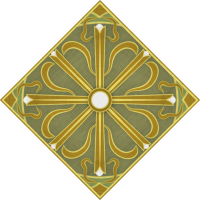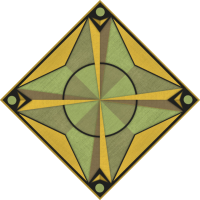Whatcha Gonna Call It?
Dec. 14th, 2018 06:56 amFrom one of my very old AUs where Aegnor and Andreth do marry and have a daughter. But everything still is not happy rainbows, because there's no convenient proclamation from Eönwë on the very serious divide of elven souls, which bound with 100% certainty to Arda, zero ambiguity about eternity and afterlife, versus the mortal ones that do have all that ambiguity and permanent separation after death completely alien to elves. And what does that make their impossible offspring? But this story is about lighter problems than those issues. Eventually.
It started with a question which should have been harmless. Everyone had already exhausted all the thorny or offensive or just plain unanswerable questions like why Aegnor married a mortal and was that even possible or ethical or physically possible. The last question turned Angrod’s brother a very bright red, though his new sister-in-law, Andreth, only gave him a look that could have turned Tarn Aeliun into a dry valley. No, neither of them had any idea if their souls would have a chance to stay together after Andreth’s inevitable demise, or if Aegnor was doomed to a widowhood that not even Grandfather Finwë had faced. Having his prudent advice ignored, their big brother Finrod down in Nargothrond was now writing letters to all the Wise-women of the three Edain tribes and the philosophers among the Eldar (which consisted mostly of Finrod himself, two advisers of Thingol, and one loremaster living with Fingolfin - the majority of the Noldor either uninterested in esoteric questions of soul, especially strange mortal ones, or had stayed behind in Aman to begin with) to bring together in a colloquy to discuss the impact of the first marriage of immortal to mortal and what were any possible changes or transfers in the nature of their bodies and souls. The philosophers were still struggling with the definition of a soul that appeased everyone, immortal and mortal, before moving onto the thorny questions concerning the union of them. “Or you could come up and visit,” Aegnor had said, though the idea of becoming his brother’s newest focus of heavy scholastic observation was not thrilling. Finrod still had not been convinced this marriage was not a disaster waiting to happen, but he kept those reservations private. The belated wedding gift to Aegnor and Andreth had been accompanied by a note scolding them for the lack of invitation, which Angrod found a little 'closing the barn door after the horses', to quote Belegor. And it wasn't as if Angrod had been present to fulfill the role of father-of-groom either, as Aegnor had delivered the news fait accompli with Andreth in tow. But Finrod pointedly declared his support of the union with a gift. Publicly he was loudly and enthusiastically supportive. He had even shouted down their half-cousins for implying Andreth, as a mortal, was as beneath a prince of the House of Finwë as one’s horse and bordering on bestiality to begin with. Sensitive on behalf of the Edain in general, that insult to mortals, the House of Bëor, House of Finarfin, and his baby brother and favorite sister-in-law had goaded Finrod to not only shouting but nearly throwing nearby objects. Angrod had been very proud.
Andreth’s side of the family, Boromir of Ladros and his kin, had their own set of reservations about their eldest daughter marrying one of their elven liege lords without telling anyone, but the fuss they made was much quieter. Funnily enough, the most awkward part, after Beril screamed at her sister for daring to do this (elopement with an elf) without informing her at all, was Lord Boromir addressing Aegnor as ‘Son’ with an uncomfortable grimace. Aegnor was delighted and had immediately taken to calling the old Bëorian lord ‘Father’.
Secretly, Angrod wondered if this whole mess should have been a surprise, for Aegnor had assimilated to the Bëorians in Ladros more rapidly than their sister had to Doriath. Every morning Angrod checked his brother for sign of stubble on his cheek or gray hairs, for that was the inevitable next step after learning the mortal tongue, drinking mortal beer and eating that mortal food dish involving stuffing animal organs with more meat, wearing mortal clothing, staying in mortal halls, and falling in love with a mortal woman.
Everyone was curious to see if Aegnor and Andreth could conceive a child, the disparities of soul and body balanced against similarities, and Finrod’s colloquy by correspondence side-tracked into tangents involving hypothetical marriages between elf and dwarf and mortal men and dwarves and how would those unions work. This led to some questions about Círdan that made Thingol and the other old Sindar howl with laughter, with the eventual consensus reached that conception was impossible. Until of course the morning Andreth announced she was. ( Read more... )








